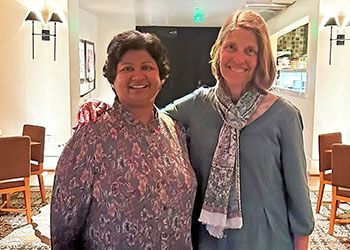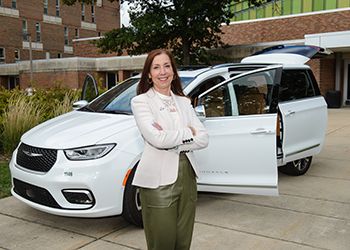Life lessons for Spartans
Alum Okhee Lee has supported scholarships and documented an estate gift for scholarships in the Colleges of Communication Arts & Sciences and Education. In 2022, she was a featured speaker during a baccalaureate ceremony, where she also received an honorary Doctor of Humanities degree. The following is an abridged version of a speech she gave.
April 5, 2024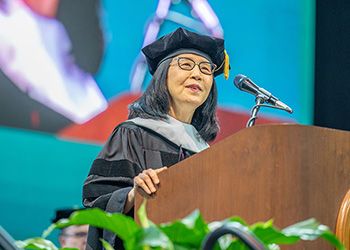
MSU Graduating Class of 2022: Today, I am speaking not only for myself but also for my late husband, Michael Salwen, as two MSU alumni. Michael is very much with me today, looking down on his wife with pride.
As you close out this chapter and embark on a new path, I would like to share four lessons from my life experiences as I have been called both a troublemaker and a trailblazer.
I think of my life in three phases. My life in the Lee family, my life with Michael and my life as Okhee.
The first phase consisted of 25 years in South Korea.
I was born five years after the Korean War and grew up in a remote village. This was not the South Korea you know from K-pop or BTS.
When I completed a master’s degree, I was told that university positions were for men, not women. Two options were available to me: the marriage path and becoming “so-and-so’s wife, so-and-so’s mother and so-and-so’s grandmother” … or the career path and becoming an old spinster.
So, I created a third option: Pursuing a doctoral degree in the United States.
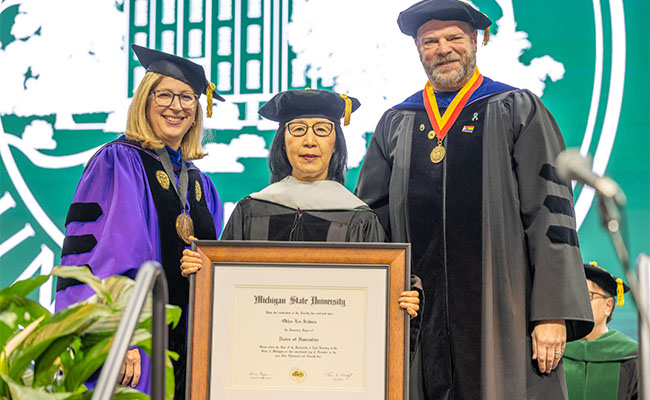
To study in the U.S., I would need a scholarship. I asked my father to delay any marriage arrangements for one year. Then, I struck a deal with him: If I got a scholarship, I would pursue a doctoral degree in the U.S. If I didn’t get a scholarship, I would follow his wishes. I think my father never dreamed that his daughter had a chance.
I took a risk … and I won.
Michigan State University gave me three years of guaranteed scholarship. I am grateful to the university for taking a chance on me, a troublemaker who defied the established order of Korean society.
So, I left my family and my country.
I learned my first lesson.
LESSON 1: DO IT. DON’T LEAVE YOURSELF WONDERING “WHAT IF?”
The second phase of my life lasted 25 years, starting at MSU.
When I arrived in the U.S., I was alone—just me, my dream and my luggage.
Sometime later, I thought back on the Korean Air flight and the passenger announcements before we took off. Of course, it came in Korean. … Here is the English translation that many of you are familiar with: “In the event of an emergency, first put on your own oxygen mask, and then help your neighbor.”
Did I hear that right? Put on my mask … before helping my neighbor? Taking care of myself isn’t selfish; it’s about being healthy and happy so that I can take care of others.
LESSON 2: TAKE CARE OF YOURSELF … TO TAKE CARE OF OTHERS.
I remember well the day I arrived on the MSU campus on August 2, 1984, to pursue my doctoral degree. It was an honor that the Institute for Research on Teaching in the College of Education recruited me as a research intern.
From the start, I lagged behind my peers who were born and educated here. I spoke English, but did not have command of the language. American culture baffled me. My family and friends were far away.
So, I worked. One extra hour every day. Over the course of my career, the hours have added up – 365 days a year for close to 40 years. You do the math.
LESSON 3: PUT IN THE WORK.
Soon after I arrived at MSU, I met Michael, who was a doctoral student in the College of Communication Arts and Sciences. We lived on the same floor in Owen Hall.
After he took a faculty position at the University of Miami, we had a long-distance relationship until we married. Our small ceremony took place at the MSU Museum in front of a historic — or should I say prehistoric — witness: the Allosaurus dinosaur.
When I completed my doctoral study [in Educational Psychology in 1989], I joined Michael to work at the University of Miami. For the next two decades, my life revolved around research, teaching and my husband.
And I was happy.
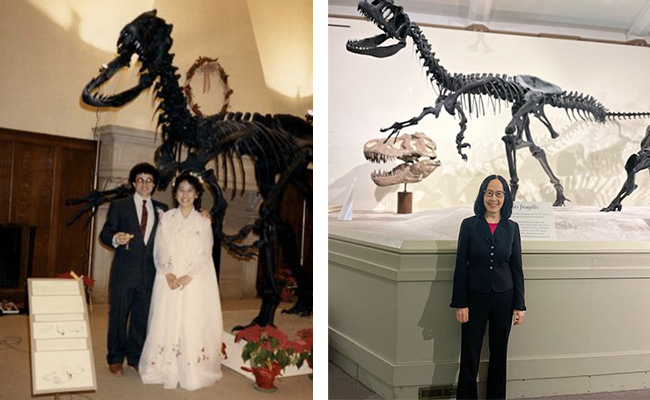
Right: Lee at the MSU Museum in 2022
But my happiness with Michael ended when he died — too young — after battling several years with cancer. Caring for him during his illness made me stronger, more resilient.
It also prepared me to become a trailblazer in education research and policy.
Soon after Michael’s death, I put on his favorite record, Beethoven’s Symphony No. 9. It carried me back to the concert we attended at the New York Philharmonic on New Year’s Eve many years before. As the music swelled, I thought about how Beethoven left his great works behind for the rest of humanity. I am no Beethoven, but I wanted to leave something behind.
LESSON 4: MAKE YOUR MARK ON THE WORLD.
The third phase of my life began in my early 50s when I joined the faculty at New York University.
In my professional life, my research focuses on the role of language and culture in science and STEM (science, technology, engineering and mathematics) education. When I first started this research, people would ask: “What do language and culture have to do with learning science? Science is universal!” Decades later, my work has paved the way for issues of diversity, equity and justice in science and STEM education. More broadly, I advocate for improvements in the education system by reaching the highest policy levels, including the White House and the National Science Foundation. In my personal life, I keep Michael at my side. As we didn’t have children, we used our assets to create scholarships (see below) that help other people’s children, especially those who need a helping hand as I needed it four decades ago. It is my goal to give back what I don’t personally need. Every bit of it.
I strive to make a difference, leave a legacy.
[When you graduate], you leave MSU and chart a new path.
Rejoice in the accomplishment of finishing your degree in a time of unprecedented challenges. You are more resilient for it. And you will continue to build resilience.
If you have something to prove, first, prove it to yourself.
Create your own choices.
Take care of yourself, and then take care of others.
Adjust your own oxygen mask before you reach over to help your neighbor.
Work hard, make your mark on the world and live without regrets of “what if.”
Be troublemakers. Be trailblazers.
Congratulations on your accomplishments, MSU Graduating Class of 2022!
Learn more about the Salwens and their intended scholarships for the Colleges of Education and Communication Arts and Sciences.
ABOUT OKHEE LEE
Okhee Lee is a professor in the Steinhardt School of Culture, Education and Human Development at New York University. Lee is recognized for her work in research, policy and practice promoting science and language learning for all students—especially multilingual learners.
Learn more about her career (and her time at MSU!) in “EXPLOR(ED) with Dean Jackson.”
Watch Okhee Lee deliver the above commencement speech courtesy of WKAR.


